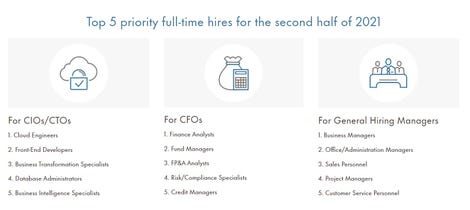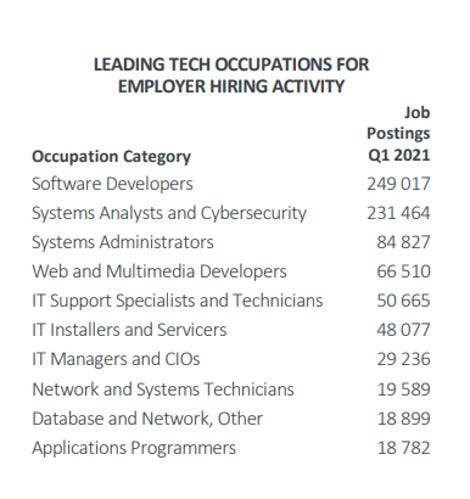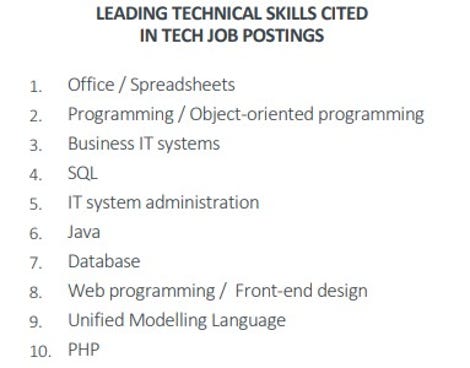In the future, as more companies seek a digital-first approach to their business, the demand for digital skills will grow exponentially. Finding developers, cybersecurity experts, and cloud migration experts is a challenge for many recruitment managers, as organizations are looking to long-term growth and sustainability after a period of rapid change. This is the most important issue.
This range of demand is reflected in the booming tech employment market. According to CompTIA June 2021 European Tech Hiring Trends Report, Employers posted 900,000 ads for new tech jobs in the first quarter of 2021, an increase of 40% compared to the third quarter of 2021. Software developers are listed as the most sought after occupational categories and are quarters.
Developer wanted
The call to developers is consistent throughout the pandemic and could be one of the biggest hiring challenges for employers over the next few months. This was certainly true for 61% of the respondents in the 15,000 developer and HR manager survey by the technology adoption platform CodinGame, which provided a snapshot of the company’s most sought-after development and programming skills in 2021.
CodinGame 2021 Developer Survey, A survey conducted between October and December 2020 found that 64% of companies are looking to hire up to 50 developers in 2021. Other companies had more ambitious recruitment goals. Hire more than 100 new developers in 2021.
Coupled with the growing demand for coders, knowledge of programming languages is also required by companies that are undergoing digital transformation and launching new apps and digital platforms.
According to the same CodinGame survey, JavaScript, Java, and Python are the most important programming languages for employers, with nearly 60% of respondents blaming particularly high demand for JavaScript and Java. This makes sense given the explosive growth of mobile and web apps since the inception of the pandemic, and also supports CodinGame’s findings surrounding the demand for full-stack and back-end developers. Java is the most popular language for building web application backends. all.
Image: CodinGame
Recruiters expect it to be particularly difficult to fulfill the DevOps role. The switch to remote work has surged the demand for DevOps experts who can manage an organization’s cloud infrastructure and help businesses move their services to the cloud.
According to CodinGame, this trend is expected to continue throughout the year. Forty-three percent of survey respondents cited DevOps position as the number one challenge for adoption in 2021, back-end developers (41%), full-stack developers (41%), architects (33%), and software engineers. (twenty four%).
Encounter between software development and operation
According to GitLab April 2021 Skill up for enterprise DevOps skill reports, DevOps skills are projected to grow 122% over the next five years, making them one of the fastest growing skills among our employees. In the United States, there have been over 300,000 jobs requiring DevOps skills in the last 12 months, and this demand is rapidly expanding across roles, organizations and industries.
This demand has also been reflected in the UK, where the UK had to address the existing digital skills shortage that was significantly exacerbated by the combination of Brexit and COVID-19.
A study released in June by recruiter Robert Half found that demand for DevOps skills increased by 319.4% in the 12 months to June as companies continue to integrate software development and IT operations. understood.
Robert Half’s studyCollected between April and May 2021, provides a more general overview of the skills organizations need later this year and is eager for recruitment managers in various departments to perform best. increase.
For Chief Information Officers (CIOs) and Chief Technology Officers (CTOs), the top five preferred hires in the second half of 2021 are cloud engineers, front-end developers, business transformation specialists, and database administrators.

Image: Robert Half
Interestingly, when the CIO and CTO took the quiz about the most important interim recruitment, the results were slightly different. In this example, the front-end developer topped the list, followed by cloud engineers, system security specialists, business intelligence specialists, and network / system managers.
Software as a Service (SaaS) skills and Python were also emphasized as increasingly important professional skills for employers, with demand for them increasing by 143.1% and 136.5%, respectively.
Again, developers find themselves in a better position in the post-COVID job market. Phil Boden, senior manager at Robert Half, told ZDNet: Java “
Mixed image
CompTIA’s recruitment report also reports high demand for Java and PHP, and programming languages feature the 6th and 10th most cited technical skills in tech posts.

Image: CompTIA
However, these languages are “Programming” (2nd), “Business IT Systems” (3rd), “IT System Management” (7th), “[Microsoft] Office / Spreadsheets maintained the almost universal job entry requirements and was the number one skill needed by employers.
CompTIA states that job listings “always match the job the employer is trying to perform.” This helps explain the variability in importance placed on the different skills in the report. However, it points out that almost all technology jobs share many common skill threads. Software, infrastructure, data, business applications are all represented, and employers often “expect some degree of cybersecurity, data, cloud, project management, and related things. Technical skills.”

Image: CompTIA
The report says: “At the skill level, a summary analysis of all job listings for all tech jobs suggests that employers tend to look for balanced candidates. This is a new platform, a new coding language, New hardware and devices, new data streams, and new combinations of technology building blocks (think IoT) are a de facto part of the job for tech professionals. “
It also explains why employers are increasingly expecting baseline IT security knowledge from workers, but cybersecurity is often not specifically mentioned in skill reports.
Take the United Kingdom as an example. 2021 City and Guild Skill Index Job listings for “cyber security engineers” in this country, announced in June, increased significantly to 19,222% between April 2020 and April 2021, but jobs for “cyber security engineers” Increased by 292%. This is compared to a 312% increase in “Full Stack Developer” ads and an 184% increase in “Azure Architect” job listings over the same period.
Cyber security above all?
The demand for cybersecurity professionals is by no means limited to the United Kingdom. In a September 2020 Harvey Nash and KPMG report, more than one-third (35%) of the 4,200 IT professionals surveyed cited cybersecurity skills as their most sought-after skills, and cyberprofessionals around the world. Identified a large demand for.
This demand continues until 2021. Harvey Nash 2021 Tech Salary and Hot Skills ReportPublished in June 2021, cybersecurity remains the number one skill for employers in the United Kingdom (31%) and the United States (36%). Harvey Nash CEO Beb White told ZDNet, “Because security specialists are required to play an important role in protecting their businesses in the unprecedented challenge of moving to large-scale telecommuting. , Demand is rising throughout the pandemic. “
look: Cyber Security: Why a culture of silence and driving mistakes is bad for everyone
Harvey Nash delves into the types of roles companies employ, with ethical hackers, information security analysts, chief information security officers (CISOs), and cybersecurity consultants all working prominently. I found that.
In addition to IT security, employers also seek cloud and data / analytics expertise. Again, this reflects the changing demands of business needs as digital transformation accelerates and more companies shift significantly to telecommuting.
Among the cloud-specific roles employed by enterprises, Harvey Nash identifies strong demand for “cloud architects,” “cloud engineers,” “cloud security specialists,” DevOps engineers, and “Amazon Web Services specialists.” did.
“Organizations are becoming more sophisticated in how they deploy and leverage their online assets through distributed clouds, edge computing, marketplace platforms, and more, rather than just moving software online,” Harvey Nash said. I am.
Data everywhere
Within the realm of data and analytics, companies are particularly keen to play roles such as “data analysts,” “data scientists,” “data engineers,” and “business intelligence analysts.”
“The skills that drive change are customer-focused skills and skills that connect an ever-growing array of technologies and platforms,” White said.
“On the customer side, there is a growing demand not only for UX professionals, but also for digital professionals with high customer service and product development skills. On the technical side, there is a growing demand for architects with a focus on cloud platforms. increase. “”
As businesses digitize, so does the demand for niche skills, especially those related to automation and artificial intelligence / machine learning technologies. It’s one thing that companies need to collect the data they need to inform them of the next steps in their transformation journey. Understanding and using it is a completely different thing.
Organizational change management (27%), enterprise architecture (23%), technology architecture (22%), and advanced analytics (22%) were also identified as skills that companies are facing shortages in 2020. Harvey Nash / KPMG CIO Survey..
Outlook
Lack of digital skills is not a new issue for businesses, but it is a problem that has become significantly more urgent with COVID-19.
Digitization efforts may have put many companies in a better position to tackle increasingly data-driven economic challenges, but it is also necessary to foresee these plans. Facilitated further demand for skilled technicians. ..
Employers are facing problems here. As the demand for technology workers grows, the pool of available talent is shrinking rapidly. Software developers, cloud engineers, DevOps professionals, and cybersecurity engineers all need to build, maintain, and protect their businesses for the next step in the transformational journey accelerated by the global epidemic.
To meet increasingly complex technical needs, companies not only attract and retain this talent in the increasingly competitive employment market, but also level with the skills needed to develop existing employees at a pace. You need to be an expert to upload. This may not completely fill the shortage of engineers, but it does provide some way to address the problem of skill gaps in the era of rapid digital innovation.
Developer, DevOps, or cyber security? Which top technology talent is your employer looking for right now?
Source link Developer, DevOps, or cyber security? Which top technology talent is your employer looking for right now?




More Stories
C – The Influence Factor of Many Popular Programming Languages
Introduction to Computer Programming and Programming Languages
Hypnosis For Incredible Life Impact – Programming The Vital Spirit Of Optimism And Success